How to hire your core tech team (your first employees)
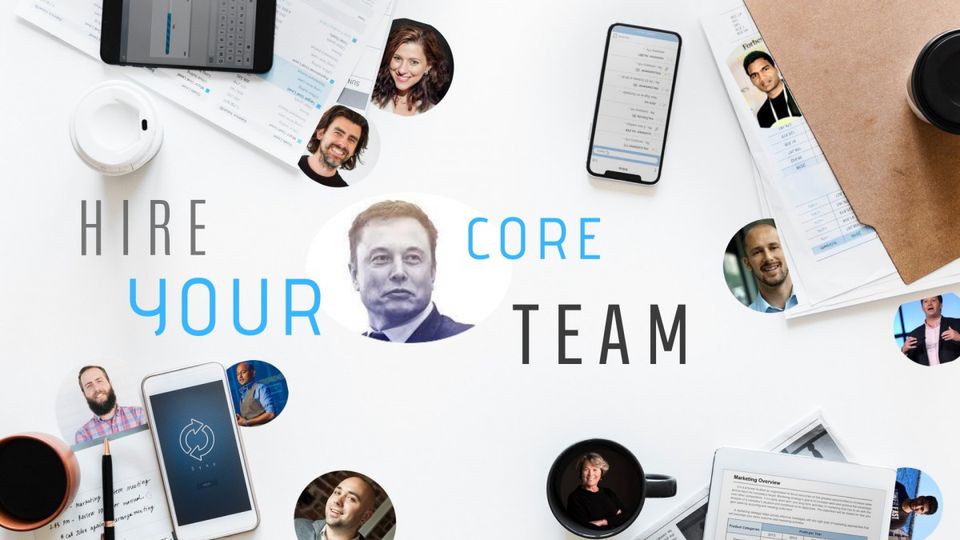
The competition in a startup ecosystem is intense and you are already in a disadvantageous position as an early-stage startup.
The big guys will always be the big guys, meaning they can offer over-the-top salaries and benefits you can only wish you had. You can’t compete with them in the fields of salary or benefits. But as any general knows, you don’t beat a bigger army head on - you change the game.
And the best way you change “the hunt” for talent is by focusing on benefits only you (as an early stage startup) can offer. You have a big advantage here: Great early-stage hires want to join early stage startups.
This guide will provide you with the how and what of hiring great people, where to find them and how to attract them to join your early-stage startup and we are starting with the obvious one
Why would people want to join an early-stage startup
An already stable company provides great benefits, amazing salary, and a great workplace culture. You as an early stage startup provide the contrary.
It’s a high-risk, high-reward place, especially when you consider the fact that roughly half of startups failed to outlive five years. It can’t get any riskier than that.
So why would anyone choose that kind of risk over a stable company with great benefits? It comes down to four different things that early stage startups do completely differently than big, stable companies.
Working on the core problem
“When hiring first employees you’re probably not offering big paychecks and corporate perks. You’re betting that others will want to join your startup for equity ownership and a belief in both what you’re building and can achieve.” - David Chait, Entrepreneur and Problem Solver; Founder & CEO, Travefy.com.
When you join an early stage startup, you are working on the core problem the startup is trying to solve.
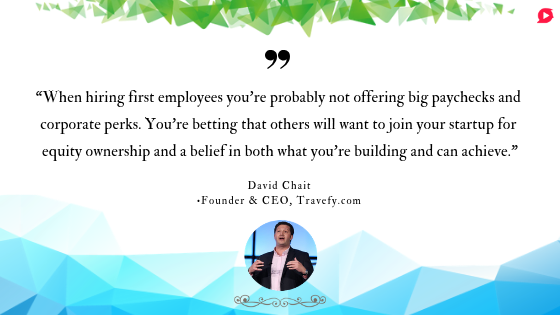
When you join a company with 5000 employees, you are just working on a small, single part of the process, improving and optimizing it so it runs better. But that “problem” is miles and layers away from the core problem the company is dealing it. You are so far away from why the company was even formed.
That’s not the case with an early stage startup. You will be working on the main problem the startup is trying to solve. You will be so close to it and the type of work you will be more meaningful.
The people who want to work like this are more focused on why they do what they do instead of what they just do.
Inside an early stage startup, you feel every single decision someone makes in the startup and you don’t look at other people in the startup as only employees. They are more than that for you and that is the second differentiator.
Tight Culture
“I think you definitely don’t want to grow too fast. Make sure that every person you hire, you really need to hire that person.” – Elon Musk
A workplace with five employees works completely different than a workplace of a thousand employees. And as anyone who has ever worked in any company knows, it’s not only about the things you can measure but also about those elusive things like fun and happiness.
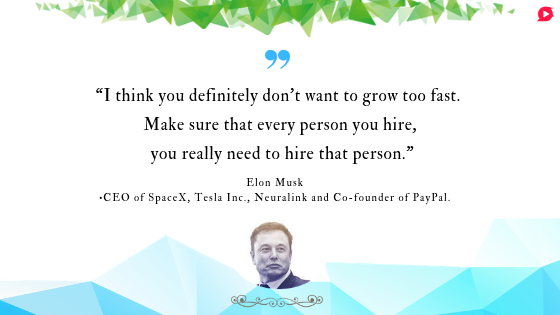
Great early stage hires are willing to sacrifice a massive salary for a really great culture fit where they think they fit. Also, when you have a startup with only a couple of people, every single person there makes a massive difference to the culture.
As Steve Jobs would say it “When you’re in a startup, the first ten people will determine whether the company succeeds or not. Each is ten percent of the company. So why wouldn’t you take as much time as necessary to find all the A-players?.…”
The people who are a great fit for an early stage startup realize that the culture plays a massive role in the company’s success and that’s why they are willing to risk with it. They know that if success happens, it will be massive which brings us to the third point.
Massive Return on Investment
*“Finding the right people is also not a matter of culture fit. Making great hires is about recognizing great matches—and often they’re not what you’d expect.” *Patty McCord, Former Netflix HR manager and author.

Taner Halicioglu just donated $75 million to UC San Diego. Oh, I forgot to mention that he was Facebook’s first engineering hire. This is exactly what people who are a great fit for an early stage startup are aiming for - they risk the present for a massive ROI in the future.
But it’s not just about the money - it’s about more than that in the workplace. And research done by Daniel Pink, laid out in his book Drive, told us what motivates people in general and that is our last point.
Self-Directed Work
“...Make sure your key team members can’t see themselves being happier working anywhere else. We find that the most important thing you can do to make them happy is to trust them and give them the autonomy to make an impact.” Nick Francis, Co-founder Help Scout
People are motivated by autonomy, purpose, and mastery and an early stage startup provide just that. It’s the perfect place where you have the autonomy to work, you can be self-directed because a startup is generally a hectic and chaotic workplace.
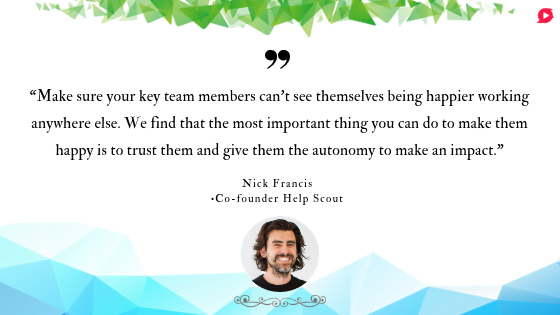
Also, you are close to the core problem of the startup which provides you with purpose. These are the points that you can use as an early stage startup to motivate people to join you and your cause.
It’s not the game of massive paychecks and amazing benefits that you can win - it’s the purpose of working on the core problem, the tight culture, possibility of massive ROI and the autonomy of self-directed work where you win people over.
All of this sounds great, but how come startups still don’t manage to survive more than five years. Because it’s not just about the knowledge of what you need to do, it’s about executing and that is where the problems hit you in the head.
So here are the main problems of an early stage startup and how you can fix them with great hires.
The trapholes of an early stage startup and how to avoid them
“When it comes to your team, it's make or break. There is no in between. The right people will propel your business further and faster than you ever imagined, while the wrong ones will hold you back, cause unnecessary delays and expenses, or even lead to the end of the road for your business.You're only as good as your weakest team member.“ Ajit Nawalkha, Co-founder of Mindvalley
Hiring great people who can fit your exact culture, provide the necessary technical skills and have soft skills which make them a delight to work with is super hard. And if you try to do it alone, it’s nearly impossible.
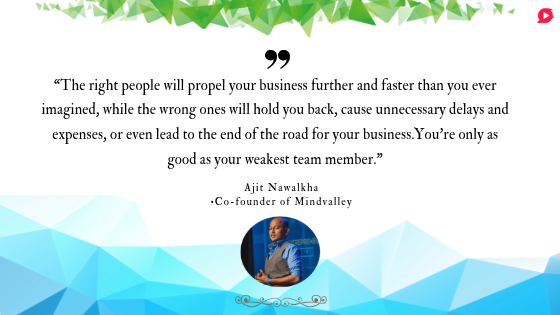
So here are the main areas where problems occur and here is how to solve them.
High-Risk Business
"You’re not looking for tasks they can do this week only. You must have repeatable work for them to take on. You don’t want to make the same mistake I made early on, when I hired because I was so busy (right now), without thinking about the ongoing workload (or lack thereof)." - Brian Casel, Founder at Audience Ops
Every startup is a high-risk business and the first thing to providing success for it is finding and on-boarding great hires. A high-risk business doesn’t have to be any harder than it is in reality.
So when you want to hire a person, you need to make sure that it’s the right person and not just someone who will be an additional hand when you need one.
“What happens when you’re a startup, and you are living on borrowed time, and you are so strapped for resources that you will fail if you don’t have warm bodies there doing the work? You STILL hire slow.”
Carrie Kerpen, CEO at Likeable Media
Make sure that every new hire reduces the risk of the business, not increases it.
To do that, you need to hire more than just a position. You need a person who can do multiple roles and positions at the same time.
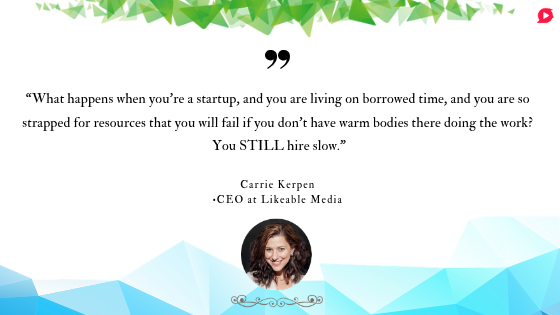
Wearing Multiple Hats
“It’s powerful to tell employees they are valuable and to ask what they need to stay. If you hire a developer, they may still be involved in marketing or design because everyone wears a lot of hats at a small company."- Brennen Byrne, Co-founder Clef
When you are hiring an engineer at an early stage startup, you don’t just need an engineer. You need someone who can develop and create an entire department of engineering. But that doesn’t mean that you need a CTO - you just need an engineer with an entrepreneurial mindset.
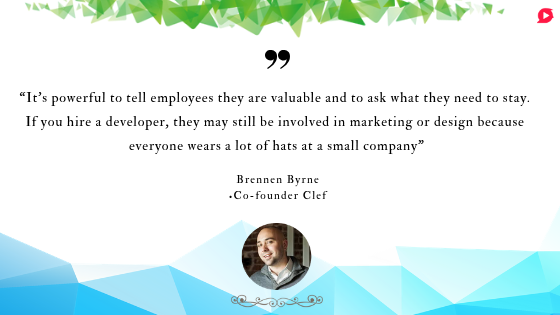
Because if you start labeling your positions explicitly, especially in an environment where a salesperson isn’t just a salesperson nor is an engineer just an engineer, you will force away the people who you exactly need.
The people who (can) wear multiple hats don’t think of themselves as positions, they think of themselves as character representations.
So a great engineer who likes to tinker on is own is a perfect example of an “early stage CTO” - the same rule applies to different positions like a salesperson etc.
Cut huge time-wasters
“I hire people who are exponentially better at me in their field and so I trust them to do their job well. I want them to take things off my plate, not create more work for me, so I try to give as much responsibility to my team as possible and then step out of the way.” Josh Pigford, Founder Baremetrics
Hiring is a field that requires a lot of expertise in itself and the process doesn’t stop with only hiring a person- there is the process of onboarding the person in your startup and having her/him integrate into the startup.
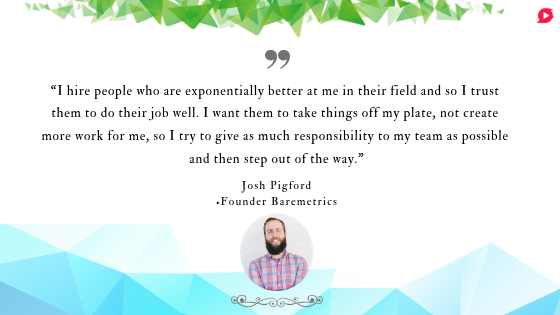
A lot of these problems you can fix yourself….if you have plenty of free time lying on your calendar. Since every single CEO of a startup has a lot of time to waste on the side, it would be great to cut the time needed to find, hire, and onboard a person.
We at Invide Labs could help you out with that. Our platform holds the world’s best programmers and we mediate the process of hiring and onboarding a person. If you are interested in discovering more about, look at this shiny workflow that we created which explains how we do what we do.
Where to find these people
"Outsourcing agencies have low standards, almost no accountability and their developers are not good. Don’t be adamant with your way of hiring - try Invide Labs. They have top talent, developers with startup experience and provide better solutions." - Nithish Monson, founder of DesignBirds
Startups, in general, have the weakest conversion rate when it comes to recruiting but that is completely fine. Because it’s not about having people, it’s about having the best people who will fit your company.
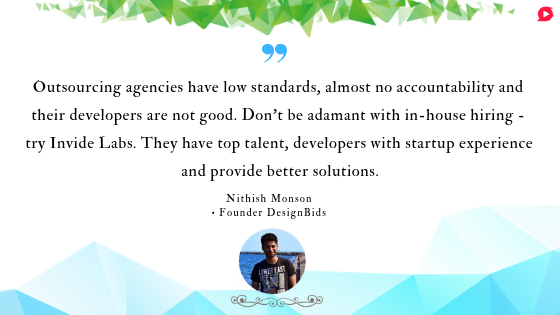
Because a single hire can change the entire company and its culture at this stage. This is why hiring is so important and why you need to find those people in places of the highest quality.
Angel list is one place like that where you can find great talent. But if you believe that you need to passionately fight mediocrity, then we suggest you visit Invide Labs - a great platform where you can find amazing programmers and even better co-founders for your startup. We at Invide Labs don’t just take care of finding and screening great talent, we also help with the onboarding process and make sure all elements of recruitment are as simple as possible for you. That isn't just talk - here is what our clients say about us.
*"Whenever you need tech expertise, it’s available immediately. Any other service takes forever to find a good developer and you lose a lot of time in the process" *- Jasveer Singh, CEO of Qikstay and a Forbes 30 under 30 serial entrepreneur
You could do this by yourself...but it would take you years and years of trial-by-error experience plus plenty of funds. Bot of these resources are scarce for a startup founder.
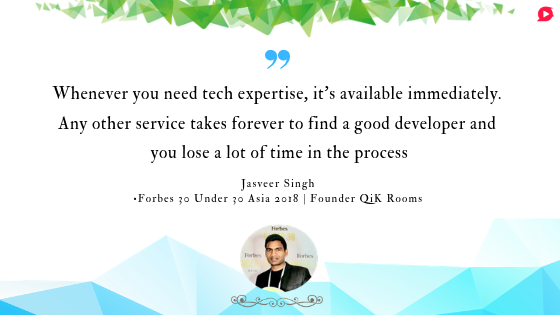
So here is Invide Labs removes unnecessary problems from your to-do list and matches you with people who are a perfect fit for your early-stage startup.
Get started by sharing your requirements with us and we will help you save time and money in hiring as well as increasing developer productivity.
More info about the process at website



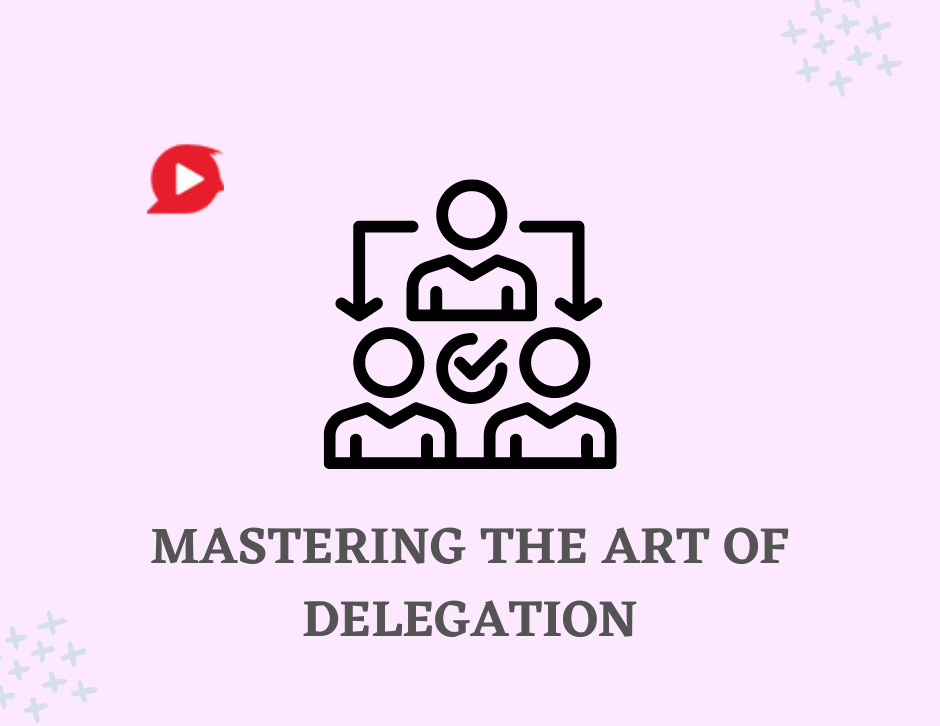


Member discussion